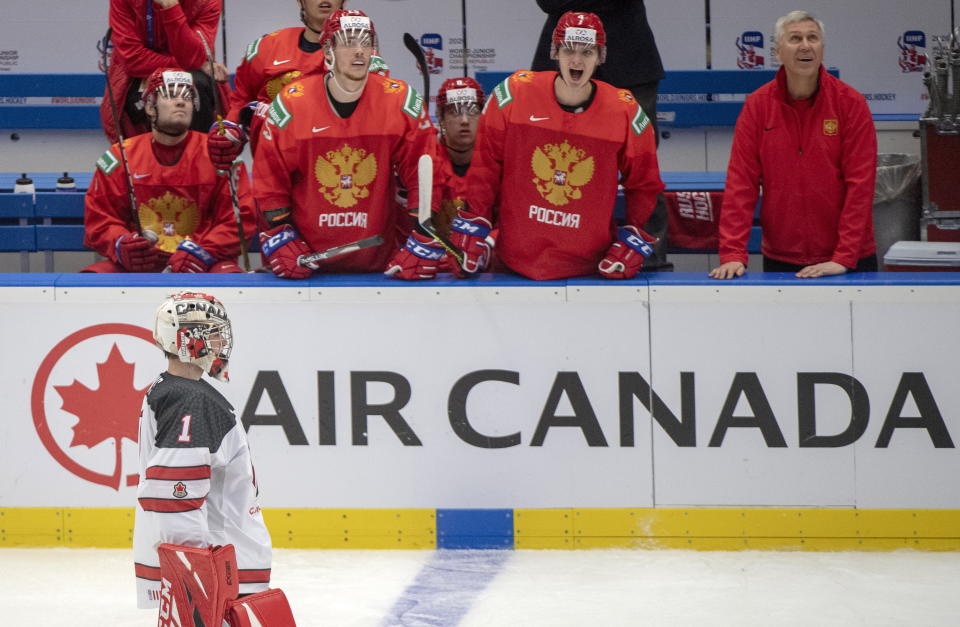4 takeaways from Canada's disastrous loss to Russia at World Juniors

This is the 44th installation of the World Junior Hockey Championships and Russia just handed Canada its worst loss in the tournament’s history on Saturday in a 6-0 rout.
There’s no need for further preamble. Let’s get right into four takeaways.
Lafrenière’s injury casts shadow over whole tournament
Any serious injury to any player is a horrible development, but it’s particularly awful that Alexis Lafrenière suffered what appeared to be a gruesome leg injury during the second period of the contest.
Lafrenière rounded Russian defenceman Yegor Zamula and tried to tuck the puck past goaltender Amir Miftakhov.
Then, disaster struck.
Lafrenière’s leg got trapped underneath him as he collided with Miftakhov, bending in a way that it shouldn’t, and he writhed in pain before leaving the game.
Compounding matters, Canada showed no response to adversity, allowing Nikita Alexandrov to put Russia up 4-0 just seconds after Lafrenière was taken to the locker room.
Alexis Lafreniere knee injury. Not good. pic.twitter.com/VSoxwII4tO
— Vinnie Parise (@VinnieParise) December 28, 2019
It’s a terrible blow to Canada’s gold medal hopes as Lafrenière clearly emerged as their best player, putting together a sublime showing in a 6-4 victory over the United States on Boxing Day.
Putting the tournament aside for a second, you have to feel downright awful for Lafrenière, who is the clear-cut top prospect for the 2020 NHL Draft. It’s highly unlikely he’ll be supplanted by teammate Quinton Byfield, Swedish forward Alexander Holtz or Russian goaltender Yaroslav Askarov - who surprisingly had the night off, but ultimately wasn’t needed.
Even still, Lafrenière’s injury casts a shadow over Canada’s chances and the tournament as a whole.
Returnees have been dreadful
A common talking point through the tournament is that is the youngest Canadian team ever at the World Juniors. Canada’s relative youth hasn’t been the problem, as the five returnees - with the possible exception of captain Barrett Hayton - have been horrific through two games.
It’s worth mentioning these are teenagers after all, so we strongly advise not to mount personal attacks against the kids. With that said, there’s no way to analyze this game without mentioning the truly dreadful performances from two returnees in particular: defenceman Jared McIsaac and forward Joe Veleno.
Let’s start with McIsaac. The defenceman inexplicably tossed the puck through the middle of the ice in the first period, which directly led to Russia’s first goal, as Alexander Khovanov picked off the pass, wired a shot off Nico Daws’ blocker, and the puck ricocheted into the air before bouncing over the goal-line.
It was a poor effort from Daws, and we’ll get to that below. Regardless, McIsaac struggled throughout Canada’s opening game against the United States, taking a senseless penalty which led directly to a goal, and was no better against Russia. McIsaac hasn’t played much this year as he works his way back from injury but if his play continues to be a liability, Canada might be better off by switching him out for Jamie Drysdale, currently operating as the de facto 7th defenceman.
Veleno has been a massive disappointment and in a game where not a single Canadian player receives a passing grade, he stands out as the notable worst player on the ice. The 19-year-old took two penalties, refused to track back against Pavel Dorofoyev, allowing his man to walk in to put Russia up 2-0, and generated nothing offensively.
It’s often billed as a 19-year-old’s tournament and this is a young Canadian team, but it’ll need a lot more from their key veterans as it regroups from a harrowing loss and Lafrenière’s injury.
A complete letdown from goaltending
What happened to Nico Daws? After keeping Canada in the game briefly against the United States, Daws didn’t help his team out at all. Although a Russian player was clearly offsides and McIsaac hung him out to dry as mentioned above, Daws should’ve made a routine save on Khovanov and appeared to lose the puck in the lights as it came down. It’s hard to blame your goaltender when everything goes wrong, but he wasn’t even close to the same form he showed on Boxing Day.
Daws was mercifully pulled after Russia went up 4-0, allowing Joel Hofer to get his first look. Hofer fared no better however, as Russia’s fifth goal was particularly soft, and didn’t do much to wrestle the job away from Daws at this point.
Canada holds three goaltenders on its roster, and though it may be worth trying Daws out against Germany, perhaps it’s time to test Olivier Rodrigue. Entering the tournament, goaltending was considered to be Canada’s uncertain element and we’re back at square one.
Group B is still up for grabs
For the first time in the history of the tournament, all five teams in Group B are tied with one win and one regulation loss apiece. After Canada got pummelled Saturday, while losing its best player, it’s easy to think that this year’s club doesn’t have much of a chance anymore, but that simply isn’t true.
Canada has two relatively easy games against Germany and host Czech Republic to finish off the round-robin portion, although it would be silly to take any opponent lightly after Saturday’s showing. It’s been a tale of two teams so far, and this Group of Death still features a United States team loaded with talent, while Russia showed off its explosive offensive quality Saturday and Germany’s Dominik Bokk is on fire. In theory, all Canada has to do is finish in fourth to advance, but this group remains up for grabs.
Throw the tape out and start anew, Team Canada.
More hockey coverage from Yahoo Sports

 Yahoo Sports
Yahoo Sports 

